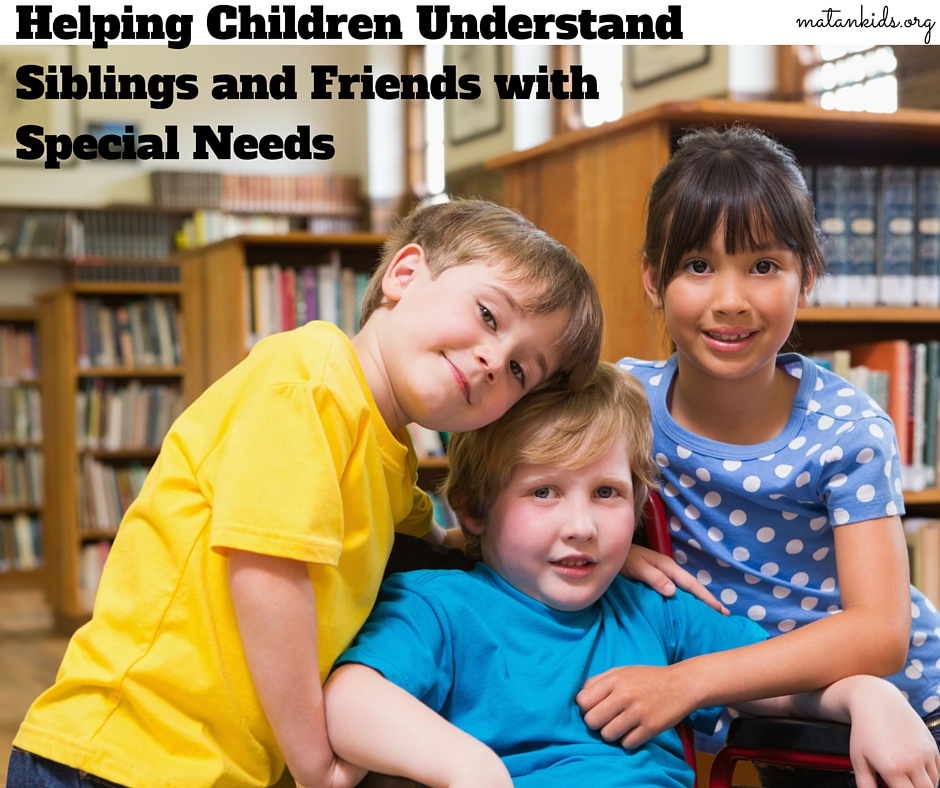 The largest minority in America is the population of people with disabilities. Children live in a world full of people who are different from each other in all sorts of ways. Helping them to understand their peers, their family members, or even themselves will create greater acceptance and respect. Whether it is at home, school, synagogues, Jewish Community Centers, or in the community, your child is bound to meet and interact with someone with special needs.
The largest minority in America is the population of people with disabilities. Children live in a world full of people who are different from each other in all sorts of ways. Helping them to understand their peers, their family members, or even themselves will create greater acceptance and respect. Whether it is at home, school, synagogues, Jewish Community Centers, or in the community, your child is bound to meet and interact with someone with special needs.
By helping children better understand an array of abilities and disabilities, you will be improving the quality of life for children with special needs who, like everyone, want to be understood and accepted. At the same time, such discussions with children provide a great opportunity to teach them the importance of making an effort to understand people who are different from them.
It is common for us to shy away from things that we don’t understand or find unfamiliar. You can demystify disabilities for your child by teaching them some simple facts and truths.
Teach the value of accepting others.
Explain to your child that when they meet someone who looks or acts differently than them, they should take time to learn more about that person. A good way to teach this value is by helping kids see that we are all different and special, but that we also have things in common – like the desire to be understood and accepted. You can even start this conversation by making a list of some ways you are different – showing them that ‘different’ isn’t a negative word.
Explain specific behaviors of children with various special needs that other children might find confusing.
For example: Autism is a neurobiological disorder which is associated with certain kinds of behaviors that may confuse others. A good way to help explain autism is by helping your child relate to how children with autism may FEEL in certain situations.
Here are two examples of how you can do this:
- Ask your child to imagine a fire truck with a siren coming close to them and how this might hurt their ears. Explain that this can be how common noises sound to some of their friends with autism. The next time your child sees a friend with autism cover his or her ears, he or she can be more understanding.
- Explain that some people with special needs may like to play in different ways than your child does. Maybe they have crutches or their muscles aren’t strong enough for certain games or maybe they have a need that affects the way they think or use their imagination. Ask your child to imagine a time when they felt excluded from a game or activity and how that made them feel.
Engaging children in the process of understanding challenges by imagining how people may feel in certain situations helps them better understand the challenges that these individuals face and behaviors that might seem unusual. It also helps them think of how they can be supportive and a good friend.
Useful resources:
Books:
The Special Needs Acceptance Book: Being a Friend to Someone with Special Needs is an informative and valuable book that helps children better understand their peers who have special needs. Using engaging exercises and educational information, it covers a range of disabilities and conditions including autism, Down syndrome, cerebral palsy, cystic fibrosis, learning disabilities like dyslexia, ADHD, blindness and deafness.
The Autism Acceptance Book: Being a Friend to Someone with Autism is an interactive, educational and character-building book that introduces children to the challenges faced by people with autism while also supporting their personal journey toward appreciating and respecting people’s differences. The book offers educational information, conversation-starters, and engaging exercises that invite children to “walk in someone else’s shoes” as they learn to treat others the same ways they would like to be treated themselves.
These books provide insight to help kids understand their friends’ challenges, while also showing them that we are all more alike than we are different.
Visit www.wateringcanpress.com to see sample pages of each book.
Free Teachers’ guides and free Jewish Educators’ Guides:
To support the use of these books in group settings and encourage the spread of inclusive messages and understanding, Watering Can Press offers free guides for teachers as well as free Jewish Educators’ Guides.
 Ellen Sabin, MPH, MPA is the founder of Watering Can Press—a publishing company that creates award-winning character-building books for children and families. She speaks across the country in schools and community settings about the topics of her books and creates new books on themes of value. Her past career was spent in the field of public health.
Ellen Sabin, MPH, MPA is the founder of Watering Can Press—a publishing company that creates award-winning character-building books for children and families. She speaks across the country in schools and community settings about the topics of her books and creates new books on themes of value. Her past career was spent in the field of public health.
